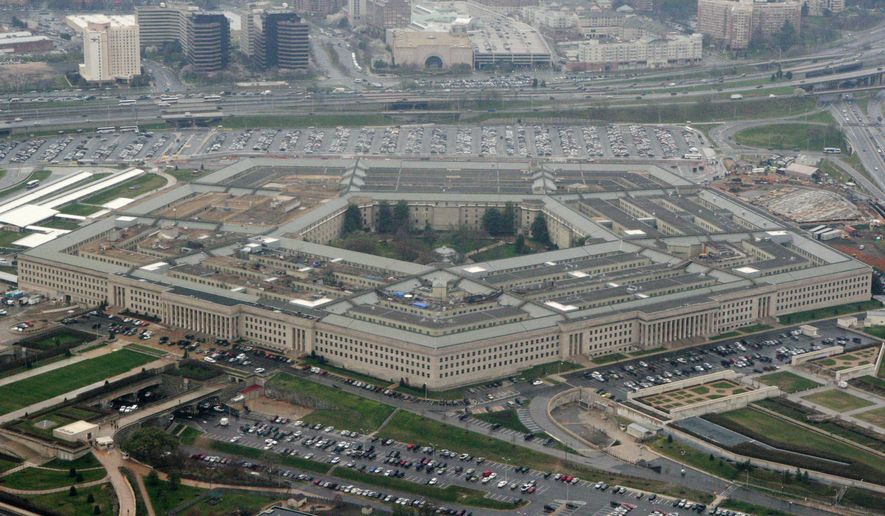The Pentagon is keeping for now a Trump administration policy that loosened restrictions on the use of land mines by the U.S. military, as the Biden administration weighs whether to re-impose tougher rules.
The issue has proven a recurring headache for the military, which faces challenges in virtually every part of the globe. Some military analysts are urging the new administration to hold off, saying that despite their critics, land mines can still play a critical role in modern combat and save American lives. Mr. Biden as a candidate last year explicitly promised to restore the old restrictions if elected.
In January 2020, then-Defense Secretary Mark T. Esper cut previous restrictions on anti-personnel land mines that authorized their use only along the Korean demilitarized zone. The move overturned a more stringent policy from the Obama administration.
“We’re analyzing the process by which that decision was made to continue to espouse conventional land mine use,” chief Pentagon spokesman John Kirby told reporters this week. “When we complete that analysis of that decision, then we’ll be able to have a better idea of whether or not further review of our land mine policy is warranted.”
Retired Army Col. David Maxwell, a former Green Beret once assigned to the heavily mined DMZ between North and South Korea, said a land mine field can mean the difference between winning and losing in an era of great-power competition between peer adversaries like China and Russia.
“They are necessary when you have large-scale enemy forces and when you’re outnumbered. We want to have maximum flexibility for military operations,” said Col. Maxwell, now a senior fellow at the Foundation for Defense of Democracies.
Mr. Kirby’s remarks at a briefing Tuesday came after another Pentagon spokesman had strongly defended the use of anti-personnel land mines, drawing complaints from human rights groups.
“Land mines, including anti-personnel land mines, remain a vital tool in conventional warfare that the United States military cannot responsibly forgo, particularly when faced with substantial and potentially overwhelming enemy forces in the early stages of combat,” said Department of Defense spokesman Mike Howard.
Pentagon officials insist their land mines have self-destruct and self-deactivate features that allow them to protect American troops from the enemy while reducing the danger to innocent civilians over the long term.
“We continue to develop technology that will minimize these effects,” Col. Maxwell said, noting that the U.S. is “also the largest contributor to demining operations around the world.”
The United States is notably not a signatory to the Ottawa Convention, a 1997 treaty that bars countries from using or developing anti-personnel land mines.
In a statement, Adotei Akwei, the advocacy director of Amnesty International USA, called on the Biden administration to reverse the decision and join the mine ban treaty.
“Land mines are inherently indiscriminate weapons that main and kill long after conflicts end. They should not have a place in the arsenal of any country,” Mr. Akwei said. “This land mine policy starkly sets the U.S. apart from its allies. It is in direct opposition with President Biden’s aspirations to be a global human rights leader.”
Mr. Biden as a candidate in early 2020 joined other Democratic hopefuls in a pledge to quickly reverse Mr. Esper’s decision, making the Pentagon’s hesitation even more striking.
“The Trump administration’s reversal of years of considered decisions by Democratic and Republican presidents … is another reckless act by a president ill-suited to serve as commander-in-chief,” Mr. Biden said of the land mine decision in a February 2020 campaign email. “As president, I will promptly roll back this deeply misguided decision.”
But Col. Maxwell argued that anti-land mine advocates only see the issue from their “narrow agenda.”
“They don’t have an understanding of military operations or military necessities,” he said. “They fail to recognize or at least acknowledge the impact it has on military operations. They do protect American soldiers when used properly.”
Col. Maxwell said he’d like to see activists direct some of their outrage at banning improvised explosive devices, better known as IEDs, pioneered by forces hostile to U.S. troops in Iraq and Afghanistan.
“Iran is producing these and employing them in support of their unconventional warfare operations,” he said. “The U.S. military has suffered tremendous effects from IEDs in the last 20 years.”
• Mike Glenn can be reached at mglenn@washingtontimes.com.




Please read our comment policy before commenting.